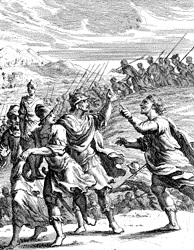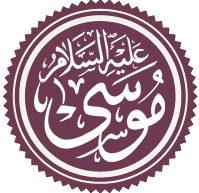 W
WAccording to the Bible, the golden calf was an idol made by the Israelites when Moses went up to Mount Sinai. In Hebrew, the incident is known as ḥēṭ’ ha‘ēggel or the Sin of the Calf. It is first mentioned in the Book of Exodus.
 W
WThe Adoration of the Golden Calf is a painting by Nicolas Poussin, produced between 1633 and 1634. It depicts the adoration of the golden calf by the Israelites, from chapter 32 of the Book of Exodus. It was made as part of a pair of paintings commissioned by Amadeo dal Pozzo, Marchese di Voghera of Turin, a cousin to Cassiano dal Pozzo, Poussin's main sponsor in Rome. By 1685 the pair had passed to the Chevalier de Lorraine and in 1710 they were bought by Benigne de Ragois de Bretonvillers. In 1741 they were bought from Samuel by Sir Jacob Bouverie, whose son William became the first Earl of Radnor. The Earls of Radnor owned the pair from then until 1945, when it was split for the first time and The Adoration of the Golden Calf bought by the National Gallery in London for £10,000, half of which was contributed by the Art Fund. It now hangs in Room 19 of the National Gallery, where it and Poussin's The Adoration of the Shepherds were vandalised with red spray paint on 17 July 2011. The French-speaking vandal covered up most of the nude figures.
 W
WBethel is the name of a place often used in the Hebrew Bible. It is first mentioned in Genesis 12:8 as being near where Abram pitched his tent. Later in Genesis, it is the location where Jacob dreamt of seeing angels and God, and which he therefore named Bethel, "House of God." The name is further used for a border city located between the territory of the Israelite tribe of Benjamin and that of the tribe of Ephraim, which first belonged to the Benjaminites and was later conquered by the Ephraimites.
 W
WDan is a city mentioned in the Hebrew Bible, described as the northernmost city of the Kingdom of Israel, and belonging to the tribe of Dan. The city is identified with a tell located in northern Israel known as Tel Dan in Hebrew, or Tell el-Qadi.
 W
WThe Golden Calf is the award of the Netherlands Film Festival, which is held annually in Utrecht. The award has been presented since 1981, originally in six categories: Best Actor, Best Actress, Best Feature Film, Best Short Film, Culture Prize and Honourable mention. In 2004, there were 16 award categories, mainly because in 2003 the categories Best Camera, Best Montage, Best Music, Best Production Design, Best Sound Design were added.
 W
WHur was a companion of Moses and Aaron in the Hebrew Bible. He was a member of the Tribe of Judah. His identity remains unclear in the Torah itself, but it is elaborated in rabbinical commentary.
 W
WIn Jewish and Christian traditions, Jannes and Jambres are the names given to magicians mentioned in the Book of Exodus. This naming tradition is well-attested in ancient and medieval literature. In Latin manuscripts of the New Testament, and in Latin writing traditions, their names are known as Jamnes and Jambres.
 W
WJeroboam I was the first king of the northern Kingdom of Israel. The Hebrew Bible describes the reign of Jeroboam to have commenced following a revolt of the ten northern Israelite tribes against Rehoboam that put an end to the United Monarchy.
 W
WThe narrative of Micah's Idol, recounted in the Book of Judges, concerns the Tribe of Dan, their conquest of Laish, and the sanctuary that was subsequently created there.
 W
WSamiri or the Samiri is the is a phrase used by the Quran to refer to a rebellious follower of Moses who created the golden calf and attempted to lead the Hebrews into idolatry. According to the twentieth chapter of the Quran, Samiri created the calf while Moses was away for 40 days on Mount Sinai, receiving the Ten Commandments. In contrast to the account given in the Hebrew Bible, the Quran does not blame Aaron for the calf’s creation.
 W
WṬā Hā is the 20th chapter (sūrah) of the Qur'an with 135 verses (āyāt). It is named "Ṭā Hā" because the chapter starts with the Arabic ḥurūf muqaṭṭaʿāt : طه (Taha) which is believed one of the names of the prophet Muhammad. Luxenberg's perspective is that the letters Ta-Ha would be a cognitive interjection of astonishment or admiration: "aha!" or "wow!" in Aramaic.
 W
WZimri son of Salu was the prince or leader of a family within the Tribe of Simeon during the time of the Israelites’ Exodus in the wilderness at the time when they were approaching the Promised Land. The Book of Numbers in the Hebrew Bible describes how, at Abila or Shittim, he took part in the Heresy of Peor, taking as a paramour a Midianite woman, Cozbi. For this sin, Phinehas, grandson of Aaron, killed them both by impaling them on a spear as they had sex.